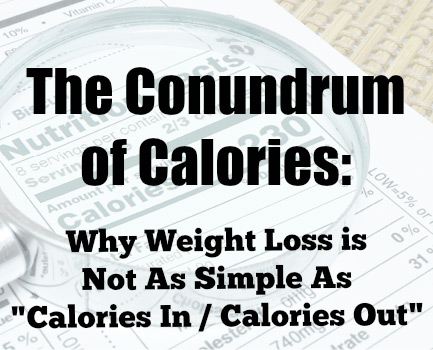
The Conundrum of Calories: Why Weight Loss is Not As Simple As Calories In / Calories Out

For years healthcare professionals pushed the idea that weight loss was as simple as eating less and exercising more.
The thinking went something like this: Our basal metabolic rate determines the number of calories our body needs on a daily basis. If we take in fewer calories than what we need, our body will use stored energy (fat) to make up the difference.
Since 3500 calories equals one pound of fat, decreasing the number of calories you take in and moving more to burn additional calories, will cause weight loss. So, for every 3500 calories of caloric deficit created, your body will lose a pound of fat.
While that may make sense mathematically, too many variables come into play in order to make that basic equation always work. Herein lies our conundrum. While calories are important, there are many more factors to take into account when it comes to weight loss and feeling better.
All calories are NOT the same.
Protein, carbohydrates, fat and alcohol comprise the different types of calories we consume. Each time we eat, we set off a series of metabolic events within our body based on the types of food we eat. Over time we have come to learn that a calorie is not a calorie.
6 Reasons All Calories are NOT Created Equal:
1. It takes more energy for our body to digest protein.
2. We know carbohydrates trigger a spike in blood sugar and the hormone insulin to be released, which signals our body to store and hold onto fat.
3. We know protein is comprised of essential amino acids, which are critical to sustaining life.
4. We know there is no such thing as an essential carbohydrate.
5. We know fat is essential to our body and our brain.
6. We know our body responds negatively to carbs vs. fat.
We know a plate full of chicken (protein) makes us feel very differently than a plate of cookies (carbohydrates).
Our body’s unique response to various types of calories means we can’t rely solely on the quantity of calories we consume, but instead must rely on the type and the quality.
Weight loss is different than fat loss.
While weight loss is easy to measure on a scale, the desired outcome for most is really fat loss.
Our metabolism impacts how we feel and how much we weigh, and our Basal Metabolic Rate is the amount of energy (calories) it takes to sustain our metabolism.
When we restrict the amount of energy (calories) we take in, our body realizes it has less energy to sustain itself. So, two things happen:
1. The body has to find stored energy to use
2. The body rids itself of whatever requires the most energy
Ideally, our body would do what we want and just get rid of fat. However, instead of doing what we want and getting rid of fat, our body turns into a department store after Christmas: Everything must GO and that includes lean muscle mass, as well as fat. If that’s not bad enough, our body will then cleave the most metabolically expensive tissue (muscle) because it recognizes there’s not as much energy coming in to sustain what it once had. The result is a lower basal metabolic rate…not good!
Exercise should do more than ‘burn calories’ and burn you out.
From a caloric perspective, the most important thing to improve our metabolism is to increase our muscle mass. It would then make sense to choose exercise that focuses on increasing muscle.
When it comes to weight loss, conventional wisdom has taught us that aerobic exercise (long-duration, low-intensity) will burn the most calories. However, the effect doesn’t drive the desired outcome.
Muscle is comprised of different types of muscle fibers. These different fiber types all need to be activated to maintain our peak metabolic rate. The issue with long-duration, low-effort exercise is that only one type of muscle fiber is activated, which also happens to be the least metabolically needy. If we don’t exercise in a manner that activates all our muscle fibers, not only will we lose muscle mass, but our metabolic rate will decrease, as well.
Furthermore, the above list is just the tip of the iceberg. Additional factors such as sleep, digestion, age, genetics and stress are but a few of the influences that complicate the calories in/calories out equation.
The Metabolic Comeback – A Simpler Way
While it is easy to become weighed down with the complexity of caloric consumption, The Exercise Coach® provides a simple solution…The Metabolic Comeback™.
Our simple formula: Whole Food Nutrition + Whole Effort Exercise = A Whole New You, delivers a tried and true formula that will transform how you look, feel and function.
The Metabolic Comeback™ is something you can experience at any Exercise Coach® studio around the country. Coming this February we are launching our first National Metabolic Comeback Challenge. At participating studios you can take the challenge, experience cutting-edge training and nutrition, and you may win a local or national prize. This year we are awarding the national male and female winners with $5000 prizes each. Visit exercisecoach.com/comeback to contact your nearest studio for more information about The National Metabolic Comeback Challenge. You must register by January 20th to participate.
We would love to help you make 2017 your best year ever! Make the commitment to a smart game plan for next year now!
